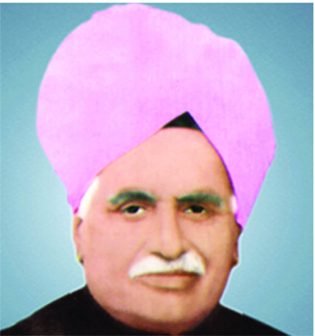Ravi Rohmetra
This is the tale of a towering personality who worked selflessly for the cause of the people. He was a friend, a guide and a social worker. During his life time he was counted amongst the great personalities of Jammu.
By the turn of the nineteenth century, Jammu started experiencing reverberations of the political and social awakening. Lala Hans Raj Mahajan was the most outstanding leader of that phase of Jammu’s history. He pioneered formation of associations of various communities like the Mahajan Sabha and the Rajput Sabha as also of the Anjuman-i-Islamia and acted as their honorary secretary which ensured their mutual cooperation in the common task of social reform. The first secular organization of the state, also non-political to start with, was Dogra Sadar Sabha in 1904. He dominated the entire social reform movement in Jammu region for half a century from 1892, when he entered public life, to 1944 when he died. His field of work included campaign for Swadeshi, rights of women, spread of education, economic betterment of backward areas, reform in ceremonies observed at marriage, death and other social occasions, help to widows and orphans cow protection, cleanliness and redressal of grievances against omissions and commissions of administration. Needless to remind that these activities were vital adjuncts of the national freedom movement. Lala Hans Raj started first two monthly newspapers in the state namely the Dogra Gazette and The mahajan Niti Patar in 1907.
Lala Hans Raj Ji was born on 2nd October 1866 at Hamirpur Sidhar Tehsil Akhnoor District Jammu in a well known family. His father’s name was Lala Harish Chand o Mahajan. At that time standard of education was not so high so he got his education at a Masjid of his village from Mian Innam Aldin in Persian and Urdu. After laying the foundation stone of Dogra Sadar Sabha and Mahajan Sabha, Lala Ji under the supervision of Maharaja Amar Singh laid the foundation stone of the Rajput Sabha for the upliftment of low caste people. When the freedom movement spread from Bengal to whole of India. Lala Ji played his role in Jammu and Kashmir. After this, he adopted Khaddar and also urged ” the people to wear “Khaddar” for this, he started a workshop to make and dye “Khaddar” at Purani Mandi Jammu. After retirement from Government job, he acted as a lawyer and helped people in one or another way.
Most of time he spent time in organizing rallies and helping poor. In October 1932 as Srinagar – riots started between Muslims and Kashmiri Pandits, Muslims attacked the house of Pandit Amarnath Kak (elder brother of Pandit Ramchandra Kak, who was elected as Prime Minister of J and K. At the time Lala Ji was at Srinagar. He came to known about this and with the help of some of his associates he reached Amarnath’s house and saved the life of his family members and took them to Hazuri Bagh near Amira Kadal. After that with the help of a local Hindu leader Keshav Bandu he decided to hold a conference in which Hindu, Muslims, Sikhs could get united and work for the whole society.
In 1926 Lala Hans Raj started Dogra Gazette whose editor was Daya Krishan Gardish. Lala Ji started tirade against the. outsiders through Dogra Gazette and forced the. State Government to reserve the jobs for the sons of the soil. The “State Subject Certificate” for State jobs came into existence. Lala Hans Raj through his life fought against the evils which were prevailing in the Hindu society and strived for the economic and social uplift of the people of the State. He was far ahead of his time. Prince of Wales College was established in Jammu because of his sustained efforts.
He fought against the dowry system, untouchability, child marriage and smoking. He favoured widow Marriage. He asked the Jammuites to get themselves educated in Urdu language if they wanted to get Government job. His efforts forced Maharaja Hari Singh to bridge the river Chenab at Akhnoor. A pioneer in the field of social reforms, Lala Ji was an institution in himself. For him social service was Parmodharma. He was held in very high esteem and reverence by all sections of the society. Hans Raj was true karamyogi who lived his life according to the highest moral values.
It was due to his keen interest and active participation in social service and social reforms that Lala Hans Raj Mahajan Ji was considered as a friend, philosopher and guide by all. They held him in very high esteem and called him Sher-e-Duggar.
He was also known as the “Dogra General” Lala Ji died in the intervening night of 26th / 27th February 1944 at 4:00 A.M. He was 77. Whole of the society was shocked to hear about the demise of Lala Hans Raj Mahajan. Every political and non-political party condoled Lala Ji’s demise.
feedbackexcelsior@gmail.com
Trending Now
E-Paper


